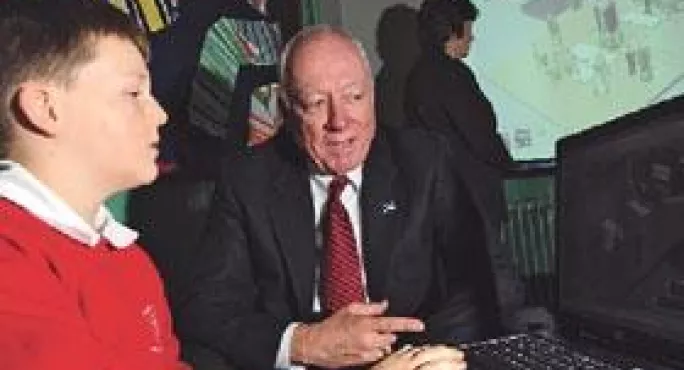Softly-softly for Microsoft
Report on Microsoft’s involvement in Scottish education
Share
Softly-softly for Microsoft
https://www.tes.com/magazine/archive/softly-softly-microsoft

Kieran Reape’s sports shop is bedecked with the Celtic logo - on the floor, behind the counter and on display stands.
Business is booming. The store is the most successful in the UK; Kieran has turned Pounds 5,000 into Pounds 670,000 in just a few weeks. But he is being careful to maintain a healthy work-life balance and looking after his staff is a top priority.
Kieran is 11. And this is a computer game - but he is still taking it seriously. Sport4Life, in which pupils become sports shop owners, was introduced to Scottish secondaries in spring 2007 by Microsoft. Since then, more than 25,000 students have played 100,000 games in around 300 centres. A modified version is being rolled out to primaries - 50 have expressed an interest.
The launch of the game marks the second phase of Microsoft’s involvement in Scottish education; a second three-year memorandum of understanding has been signed between the company, the Scottish Government and the Scottish Qualifications Authority, committing them to “integrating technology into daily teaching, learning, and research”.
Kieran’s school, Abbeyhill Primary in Edinburgh, is the first in Scotland to work intensively on the game. The pupils’ enthusiasm is palpable and, according to P7 teacher Tania Evans, it is the game’s realism that has secured its success.
Sport4Life is based on popular role-playing computer game, The Sims. Pupils can move around the shop floor, staffroom, office, boardroom and stock room. They have to make decisions about buying stock and insurance, hiring staff, arranging promotions and organising window displays, while completing the languages and maths quizzes that pop up as they play.
They must also remember not to neglect their health or that of their staff. If they fail to make regular trips to the gym or treat employees to cake and lunch, they lose points.
This free game is not Microsoft’s only foray into education. Its Partners in Learning arm has been created specifically to “actively increase access to technology and improve its use in learning”. Microsoft admits its interest is not entirely altruistic. It wants pupils to enjoy and engage with technology now so that they become customers later. However, Bob McDowell, worldwide vice-president, insisted that the company had charitable giving “in its DNA” and schools would be “disenfranchising children” if they neglected computer literacy.
Fear of change among teachers was the biggest impediment to getting more technology into the classroom. There was, he felt, “a lot of room for improvement”.
Change, however, was coming. Voice recognition software would take over from mouse and keyboard, he predicted. Technology could have a huge impact on higher education: oversubscribed courses could be opened up to far more students if they were delivered online, freeing up staff to concentrate on adding value and depth through discussion and debate in class.
You've reached your limit of free articles this month. Subscribe for £1 per month for three months and get: